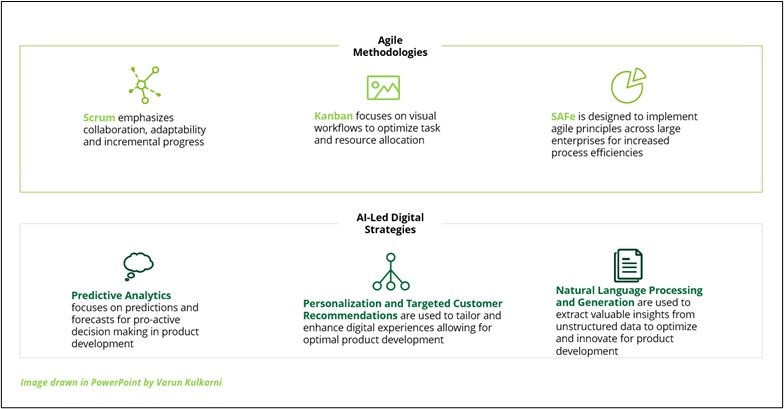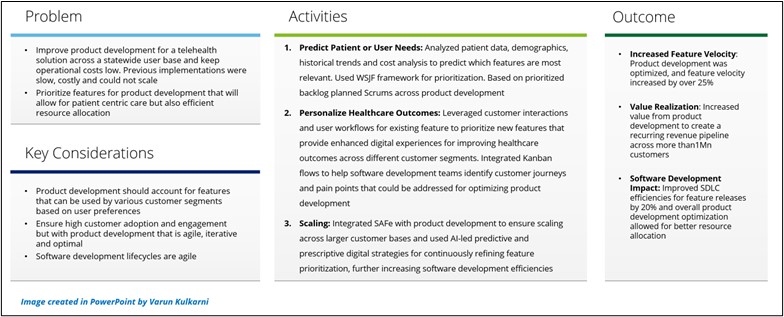AI-Led Digital Strategies for Agile Product Development
This article explores the intersection of AI-led digital strategies and agile software development methodologies to highlight product development lifecycle improvements.
Join the DZone community and get the full member experience.
Join For FreeDigitization is accelerating innovation and making global markets more competitive. To address market competition and dynamic customer needs, organizations are constantly seeking ways to enhance their software development processes and methodologies that lead to optimal and efficient product development. The focus is more on agile methodologies that allow greater flexibility and adaptability. However, when agile methodologies are integrated with AI-driven digital strategies, organizations can unlock new dimensions of efficiency and innovation in product development. The convergence of AI-led digital strategies and agile methodologies presents an opportunity for organizations to enhance product development.
In this article, I explore the intersection of AI-led digital strategies and agile software development methodologies to highlight product development lifecycle improvements. Based on my 7+ years of professional experience in product management and large-scale systems implementation, I will focus on three popular agile frameworks and AI-driven digital product strategies.
AI Digital Product Strategies and Agile Frameworks
In this section, I will provide an overview of the three most relevant or impactful AI digital product strategies and agile frameworks. These can be further scaled or extended across any other AI digital strategy or agile framework to enhance product development.

Agile Methodologies and AI-Led Digital Strategies
Agile Frameworks
1. Scrum: It is one of the most widely adopted agile frameworks. It emphasizes collaboration, adaptability, and incremental progress.
2. Kanban: It is another popular agile framework that focuses on visualizing workflow and optimizing resource allocation.
3. Scaled Agile Framework (SAFe): It is designed for large enterprises looking to implement agile principles across multiple teams.
AI Digital Product Strategies
- Predictive Analytics: Leveraging this strategy can help organizations forecast market trends, customer preferences, and potential product issues. This enables proactive decision-making and facilitates faster response to changing market conditions. Additionally, this can help prioritize product features based on a combination of historical data, user feedback, and customer trends for data-driven backlog grooming across the product development lifecycle.
- Personalization and Targeted Customer Recommendations: AI-powered personalization and recommendation engines can tailor products, services, and digital experiences to individual customer needs, enhancing user experiences. Organizations can target customer segments by analyzing user behavior and preferences to drive revenue increase adoption and engagement. This is quite essential in the age of digital transformation, as new technologies can quickly impact customer preferences.
- Natural Language Processing and Generation: These can enable organizations to extract valuable insights from unstructured data sources such as customer reviews, social media, human-readable text, unstructured data, and support tickets. This information can inform existing feature gaps, identify emerging issues, and drive innovation to optimize product development.
Product development, considering all these aspects, will be lean efficient and allow for optimal software development for best-in-class customer experiences. In the next section, I will explore how these three agile frameworks integrate with each of the three AI digital product strategies.
AI and Agile Integration
1. Scrum
1. Predictive Analytics
Integration: Scrum teams can incorporate predictive analytics into their sprint planning process. AI algorithms can analyze historical data to predict potential roadblocks, enabling teams to allocate resources and plan sprints more effectively. For example, I use predictive analytics to forecast the likelihood of specific user stories exceeding their estimated effort, helping software engineering teams better allocate resources and set realistic sprint goals. This makes iterative product development faster.
2. Personalization and Targeted Customer Recommendations
Integration: Scrum teams can use personalization and targeted recommendations to enhance user stories and features. For example, I analyze user data, user trends, user pain points, and customer journey workflows to prioritize personalized features that cater to enhanced digital customer experiences and streamline effective product development.
3. Natural Language Processing and Generation
Integration: Scrum teams can leverage NLP for more efficient communication and issue tracking. AI-powered chatbots or virtual assistants can assist with backlog management, automatically categorizing and tagging user feedback and issues based on NLP analysis. This streamlines the process of identifying common issues and prioritizing them for development.
2. Kanban
1. Predictive Analytics
Integration: Kanban teams can use predictive analytics to optimize task prioritization. AI algorithms can analyze historical task completion times and identify potential bottlenecks or delays associated with product development. Kanban boards can be dynamically adjusted to reflect these insights. For example, I always use this practice when selecting the Weighted Shortest Job First (WSJF) feature prioritization framework for product development that needs quick customer turnarounds.
2. Personalization and Targeted Customer Recommendations
Integration: Kanban teams can apply personalization and recommendation engines to optimize their workflow. By analyzing team members' preferences and skills, AI can recommend task assignments aligning with individual strengths, improving team efficiency and job satisfaction. For example, in my previous projects, software development teams used to allocate incremental feature epics for optimal product development and to monitor feature velocity.
3. Natural Language Processing and Generation
Integration: Kanban boards can benefit from these strategies by automatically categorizing and tagging incoming tasks and feedback. For example, I leverage them to help identify emerging trends or common customer issues more efficiently, enabling appropriate adjustments in backlog grooming that feed into product development iterations.
3. SAFe
1. Predictive Analytics
Integration: In SAFe, predictive analytics can be integrated at the portfolio level. AI-driven analytics can assist in identifying high-value initiatives, optimizing resource allocation across Agile Release Trains (ARTs), and predicting which features or products are likely to perform well in the market. For example, I use this technique to ensure that the organization invests resources wisely in alignment with strategic product development objectives.
2. Personalization and Targeted Customer Recommendations
Integration: Personalization and targeted customer recommendation can be used at the program level to prioritize features that align with the organization's strategic vision. For example, I use this strategy to recommend which features should be included in each product development sprint. The intent is to maximize customer value and alignment with the organization's direction.
3. Natural Language Processing and Generation
Integration: AI can analyze the sentiment and content of stakeholder feedback and automatically categorize it to help teams identify issues or opportunities. This facilitates more effective communication between product development teams. I frequently use this strategy to ensure data-driven decision-making at scale, which helps software development teams optimize implementation.
In summary, each agile framework can benefit from integrating AI digital product strategies differently, depending on the organization's needs and goals. These integrations can enhance the efficiency, adaptability, and alignment of agile product development processes, ultimately improving product outcomes and customer satisfaction.
For more detailed practical context, see below for a high-level product development use case where I integrated agile frameworks with AI-led digital strategies.
A Real-Life Use Case To Improve Product Development for Digital Transformation
 Use-Case
Use-Case
Conclusion
Integrating AI-led digital strategies with agile frameworks offers organizations the potential to drive innovation, enhance customer experiences, and improve the operational efficiency of product development processes. Finally, such an approach enables data-driven decisions across product development to create next-gen and cutting-edge digital experiences that meet all the necessary customer needs.
Opinions expressed by DZone contributors are their own.

Comments